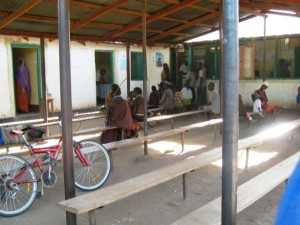
Volume 1, Issue 1 / December 2008
Health care services are a vital component of UNHCR’s mission to ensure that all refugees have access to a minimum standard of protection and essential material assistance. In Kakuma Refugee Camp, the International Rescue Committee (IRC) is the implementing agency responsible for health care provision. The organization has tried its level best to curb all health related issues.
There are four clinics located throughout Kakuma camp, with a main hospital located in Kakuma One. The clinics cater for both refugees and locals. During 2008, there were four doctors on the ground at the MainHospital, while eight nurses staffed the clinics (usually about two nurses per clinic). All clinical staff members are equipped with radios to facilitate communication between clinics and hospitals. In cas
e of an emergency, there is an ambulance on stand-by ready to rush patients to the Main Hospital. When the hospital is unable to attend to some severe cases, they refer the patient to another medical centre with better capacities—generally to Kakuma Mission Hospital or Lodwar District Hospital.
Approximately three quarters of medical staff are refugee incentive staff, with the remainder coming from Kenyan communities. A good number of medical staff members have undergone an initial course on medical training, and IRC holds periodic trainings for health workers to polish up their workmanship. No one is charged for these services. “Our curriculum is facilitated by trained doctors and nurses, and the course is an intensive combination of coursework and on-the-job training. Our medical staff members update their skills through internal trainings dealing with cross-cutting issues such as nutrition, health awareness, and HIV/Aids,” explains one IRC staff member.
To ensure that medical care is constantly up-to-date, the IRC revises their curriculum annually based on Kenyan Ministry of Health Guidelines. They also offer a library with access to major medical journals and the latest medical books. “In much of our work with refugees, we focus on knowledge transfer,” explains the IRC staff member.
By recruiting medical workers from the refugee camp, IRC is able to tap into the existing capacity of refugees to contribute to health care services. “Some refugees already have a background in medical training—for example, many refugees from the Great Lakes Region have university degrees in medicine, law, and civil services,” points out the IRC staff member. “And you can’t underestimate the power of the youth in this camp. They have been educated in the LWF schools and are very knowledgeable.” Many refugees trained as IRC medical assistants go on to successful health-sector careers following repatriation or resettlement to another country, where the knowledge they have gained gives them a competitive edge.
The world-threatening epidemic of HIV/Aids has been well catered for in camp hospitals. Anti-retroviral drugs are available free of charge to affected patients. Health education is also provided free of charge to both refugees and locals, focusing on issues such as personal prevention of HIV/Aids and mother-to-child transmission for expectant mothers. Condoms are also distributed around the camp free of charge. In addition, free HIV testing is provided for at the Voluntary Counseling and Treatment (VCT) Centers. These are some of the measures that have been taken to address the issue of HIV/Aids in Kakuma.
In 2008, the volume of demand for health care services sometimes outstripped the capacity of clinics to respond. Health workers report to work at 7:30am and leave at 12:30am in the morning session. Patients begin streaming to the clinics as early as 5:30am, and they arrive in large numbers. The afternoon service session begins at 2:00pm and continues to 4:30pm. The clinics do not always have enough wards to admit all patients. At times, the clinics experience a shortage of medication. The rainy season poses a perennial challenge to health care services, as outbreaks of malaria and diarrhea affect many refugees due to poor sanitation and drainage systems. In case of an outbreak of any disease, the clinics are first to respond by going round to the communities of refugees and local Turkana to administer treatment.
Considering the constraints under which they operate, the performance of the clinics and main hospital is very good. “Our monitoring system comes directly from UNHCR standards, and we always record an excellent performance on the ground,” points out the IRC staff member. He attributes this success in large part to a strong medical staff: “We rely on refugee staff in terms of our capacity building and program implementation. We really have good people on the ground.”
